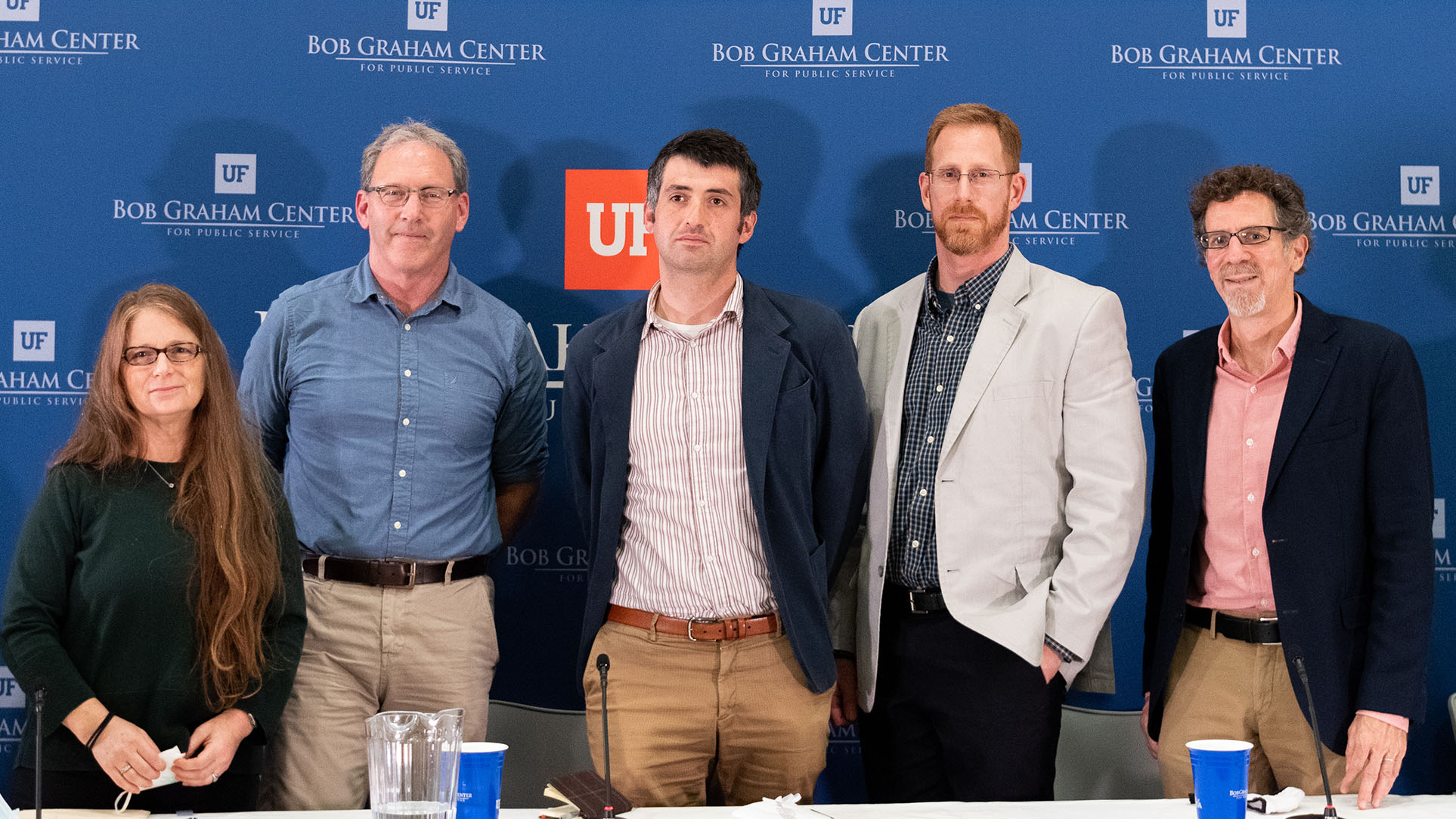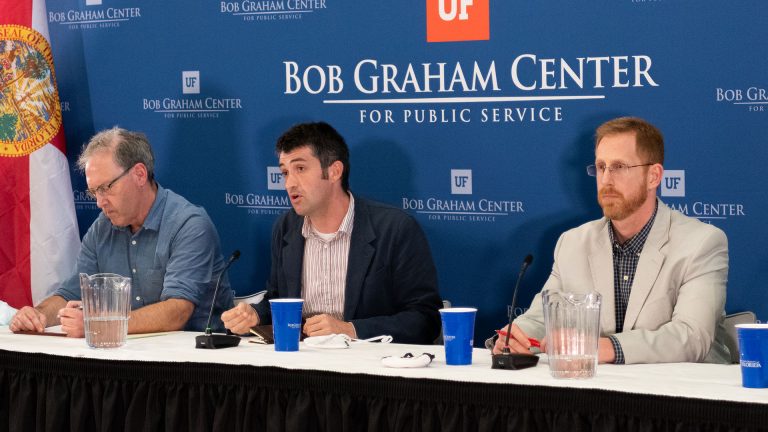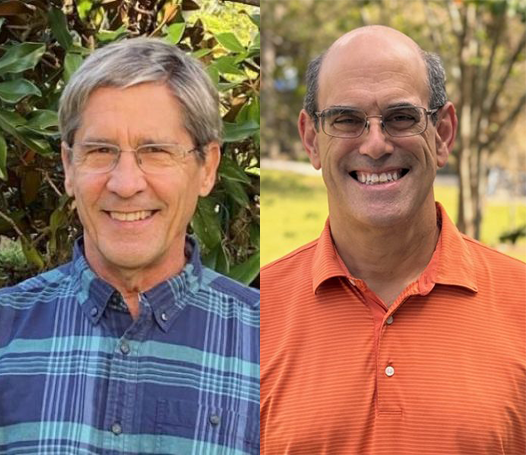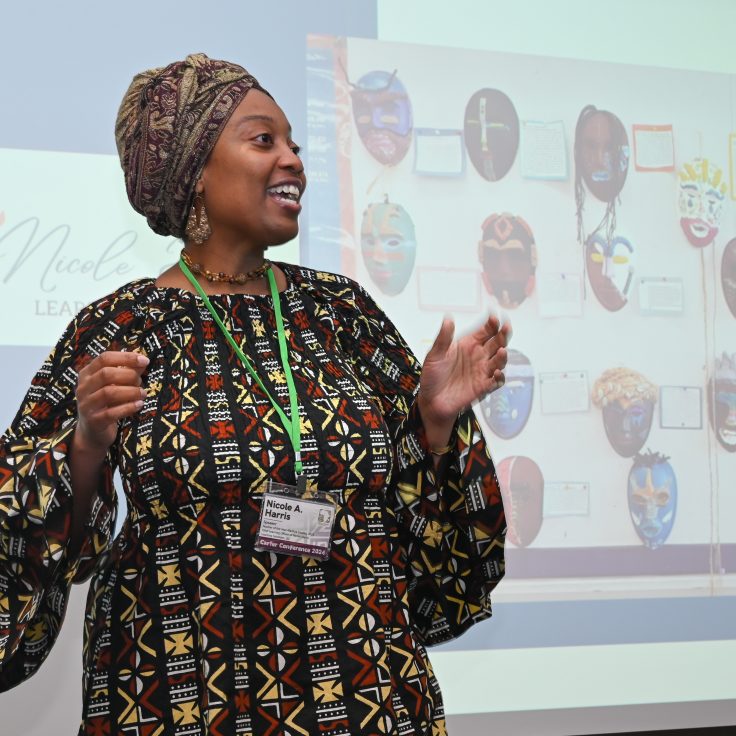
Faculty experts discuss and answer questions on the invasion in Ukraine. From left to right: Amie Kreppel (moderator), Michael Gorham, Seth Bernstein, Bryon Moraski and Zachary Selden. Photo by Irene Jose-Sala.
University of Florida Experts Weigh in on the War in Ukraine
Scholars offer historical, political and cultural perspectives on Russia’s invasion
As the campus community watches and reacts to unfolding scenes of Russia’s invasion of Ukraine, a panel of UF College of Liberal Arts and Sciences professors came together to try to make sense of it all, sharing their diverse expertise to provide clarity on the conflict.
On the evening of March 1, the College of Liberal Arts and Sciences, with additional support from UF’s Bob Graham Center for Public Service and the Center for European Studies, hosted the public panel, titled “War in Ukraine: Why, How, and What Happens Next.”
More than 500 people tuned into the discussion over Zoom and live at Pugh Hall. Amie Kreppel, a Jean Monnet Chair, Director of the Center for European Studies and professor of political science, moderated the event, featuring the following panelists:
- Seth Bernstein, assistant professor of history, who specializes in Russia and the Soviet Union
- Michael Gorham, professor of Russian studies, who teaches language at all levels, as well as courses in literature, folklore, culture, and the Russian mass media
- Bryon Moraski, associate professor of political science, who teaches courses on Russian politics and Russian foreign policy and has published research on politics in Russia and Ukraine
- Zachary Selden, associate professor of political science, who examines U.S. national security and alliances with an emphasis on the transatlantic relationship.
Those who missed the panel can watch the full recording below:
Bernstein began by offering a historical context to frame the current crisis. Russian President Vladimir Putin has declared that his incursion into Ukraine is an attempt to rid the country of Nazis, and Bernstein traced the root of the escalation back to World War II, when a nationalist movement in Ukraine collaborated with Germans. “Since 2014, some Ukrainian leaders have attempted to rehabilitate these nationalists as freedom fighters,” Bernstein said. Putin has “twisted it to make an absurd historical parallel between what happened then and what is happening today,” he said.
Bernstein is hopeful that over time Russian popular opinion will turn, as citizens begin to realize this is not a defensive operation, but an offensive attack on Ukraine. However, he also expressed worry that “as the narrative falters, we’re going to see more and more domestic repression in Russia.”
Gorham, a Russian language expert, echoed concern over the misinformation being spread throughout Russia, as the Kremlin tightens its grip on the media. Gorham explained that up until the few days immediately preceding the conflict, state-run media made little mention of its brewing. Western warnings of military buildup were deemed to be “hysteria” dreamed up by the U.S. and its NATO allies to provoke Russia into military confrontation. He said the narrative changed closer to the escalation — the state news began to describe it as a peace-keeping mission, not an invasion.
Gorham explained the efforts being made by the state to create a digital “cocoon,” monitoring and controlling information throughout Russia. “What we’re left with is a public communication environment that provides little by way of critical feedback for decision-makers and an imperfect measure of real public opinion,” Gorham said.

Moraski described the dynamics of power relations between Russia, the United States and NATO. “Putin is essentially challenging the current world order,” Moraski said. “Russia would like to return to a position of being a great power and that status has historically entailed controlling Ukraine.”
Moraski cautioned on speculation and the dangers of prediction in political science due to unforeseen developments that may lead to equally unexpected consequences. “My sense is that with Putin, if it can get worse, it kind of does,” Moraski said. “The landscape has been cleared and [the Kremlin has] set the stage for Russian control of its society as it pursues this invasion.”
Selden ascribed the remarkable success of Ukrainian resistance in major part to engagement between Ukraine and NATO since 2014. He explained how the two worked out a cooperative agreement and have diligently been working together to develop strategic areas intensely over the last few years — command, control, computers, logistics, and cybersecurity. “All that stuff sounds incredibly mundane and technical, but this is the stuff that gets you to win wars,” Selden said.
Just as remarkable was the solidarity in support for Ukraine across Europe and the United States, Selden said. “I’ve never seen a point of this much agreement and consensus as I do now…across the transatlantic space and within Europe,” he said.
Selden predicts that as the conflict drags on, it will be an increasingly losing game for Russia in terms of long-term policy goals.
“Russia, regardless of what happens militarily in Ukraine, has lost in the larger strategic picture already,” Selden said.
Kreppel, the moderator, asked the panelists their thoughts on potential solutions and the path ahead. Selden offered ways to use existing tensions in the region, such as those with Georgia, to fragment Russia’s attention in Ukraine. “Flank your opponent and change the nature of the game,” he said.
Bernstein emphasized the sobering reality of the refugee crisis, assuring the extended impact of this conflict with no easy solution. “This is how historical memory happens,” he said. “There’s more than half a million refugees — what’s going to happen to those people and what will those people think about what happens to them? It’s going to be a long war.”
In a Q & A, the audience inquired about topics spanning Russian guilt and collective responsibility, sanctioning, China’s role in the situation, and the possibility of nuclear warfare.
“Putin is willing to play with paradigms, to change what we thought were the rules internationally…and domestically. I don’t know what’s to come, but things are in flex now and a lot of options are on the table that we didn’t think were before,” Bernstein said.
To further educate the community on the crisis unfolding in Ukraine, the college and its individual units will plan a series of future events.
Learn more about the faculty panelists here.


